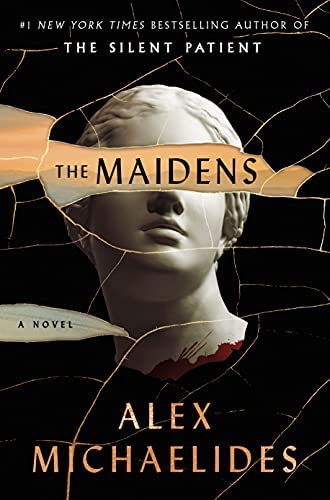‘The Maidens’ is wasted potential

January 19, 2023
This review will contain minor spoilers.
Alex Michaelides is an author who has been receiving a lot of praise lately. His debut novel “The Silent Patient” was a New York Times number one bestseller, with four stars on Goodreads and a surplus of internet attention. So, when I was in the Target book aisle and saw the author’s name on another book, I was interested.
I picked up “The Maidens” not only because of the author, but because of the synopsis. The back of the book made it sound like an academic thriller; the tale of a serial killer with Greek tragedy aspects woven in. As a huge fan of dark academia books like “The Secret History” by Donna Tartt, I was immediately intrigued. This book, however, did not deliver.
“The Maidens” follows Mariana, a psychotherapist recovering from the tragic death of her husband. When her niece, Zoe’s, close friend is murdered, Mariana goes to Cambridge University to support Zoe and get insight into the killer. Her suspicions are immediately on Edward Fosca, a charismatic Greek tragedy professor with a following of beautiful female students known as “the Maidens.”
Let me begin with what I liked about this book. The book definitely succeeded at being a “whodunnit.” I was unsure of the culprit the entire time, and the stakes felt high. Also, the killer’s M.O. was very captivating. They left postcards with creepy paintings and mysterious Greek quotes, which I found to be a very spooky dark academia-esque touch. Throughout the book, the killer left other interesting and symbolic calling cards that related to Greek mythology.
Also, I enjoyed Michaelides’ writing style, and found it very descriptive and immersive. The main character was a bit bland, but a well-developed protagonist nonetheless. I felt fully immersed into the world Michaelides built, but unfortunately it proved to be a lackluster one.
Frankly, “The Maidens” felt like a sloppy mix of interesting concepts that never really went anywhere. The novel plays with themes of power, mythology, grief, abuse, and cult mentality. Unfortunately, these interesting and poignant ideas are never fully explored or realized. Instead of combining real world themes with fantastical crime elements, Michaelides throws it all away in favor of shock value. For example, it is heavily alluded to that Mariana’s husband died due to some divine intervention by the goddess Persephone. Persephone is referenced again in regards to the Maidens, in particular a rebirth ritual Professor Fosca holds in her honor. Some vaguely mystical things happen throughout the story, but they never come to fruition.
“The Maidens” was an unfortunate waste of some really intriguing concepts. To me, it felt like Michaelides had a half-baked idea and made it up as he went along. Overall, I would recommend this book to someone who wants a twisty mystery, but not more character-based readers.
I rate this book 2 out of 5 stars.

